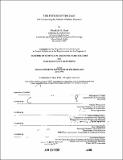The future of the past : on conserving the Mellah of Rabat, Morocco
Author(s)
Mani, Minakshi S. (Minakshi Subrahmanyam), 1963-
DownloadFull printable version (10.66Mb)
Advisor
Attilio Petruccioli and John deMonchaux.
Terms of use
Metadata
Show full item recordAbstract
This thesis examines the approach to urban conservation in the Jewish Quarter or Mellah in Rabat, Morocco. It addresses the complexities of conservation in a diverse society in a developing country. It explores how a view of the past affects the conservation rationale and argues for re-evaluating the approach to the past in evolving a plan. Through a comparison of the Rabat Mellah and other cases of urban conservation, the thesis will emphasize the need for both context sensitivity and integration with development strategies. The municipality of Rabat has initiated a proposal for. the rehabilitation of the Medina. Since its problems are more acute, the Mellah is treated separately. Rehabilitation and restoration of the existing urban fabric raises the issue of dealing with the past and future of this quarter. The proposal acknowledges the Mellah's historic importance but relates it neither to the restoration of the urban fabric nor to its future maintenance. Would preserving the Mellah as an irreplaceable monument best serve to represent, communicate and maintain its historical importance and urban character? Its conservation is further complicated by the fact that, except for three families on the outskirts, its original Jewish residents no longer inhabit the Mellah. The conservation of the Mellah has to have meaning for its current residents while respecting the memory of the Jews that it was originally built for. The patterns of change over the previous ten years are used to predict a scenario of the Mellah ten years hence, both with and without the intervention of the proposal. The case studies in this analysis highlight the necessity of including preservation within the larger urban development framework. The broader issue of imposing a universal set of values and single approach over different historic and cultural frameworks is critically discussed. Finally, an alternative set of principles is proposed and applied to a path of action for the Mellah of Rabat.
Description
Thesis (M.C.P.)--Massachusetts Institute of Technology, Dept. of Urban Studies and Planning; and, (M.S.)--Massachusetts Institute of Technology, Dept. of Architecture, 1998. Includes bibliographical references (leaves 89-90).
Date issued
1998Department
Massachusetts Institute of Technology. Department of Architecture; Massachusetts Institute of Technology. Department of Urban Studies and PlanningPublisher
Massachusetts Institute of Technology
Keywords
Urban Studies and Planning, Architecture